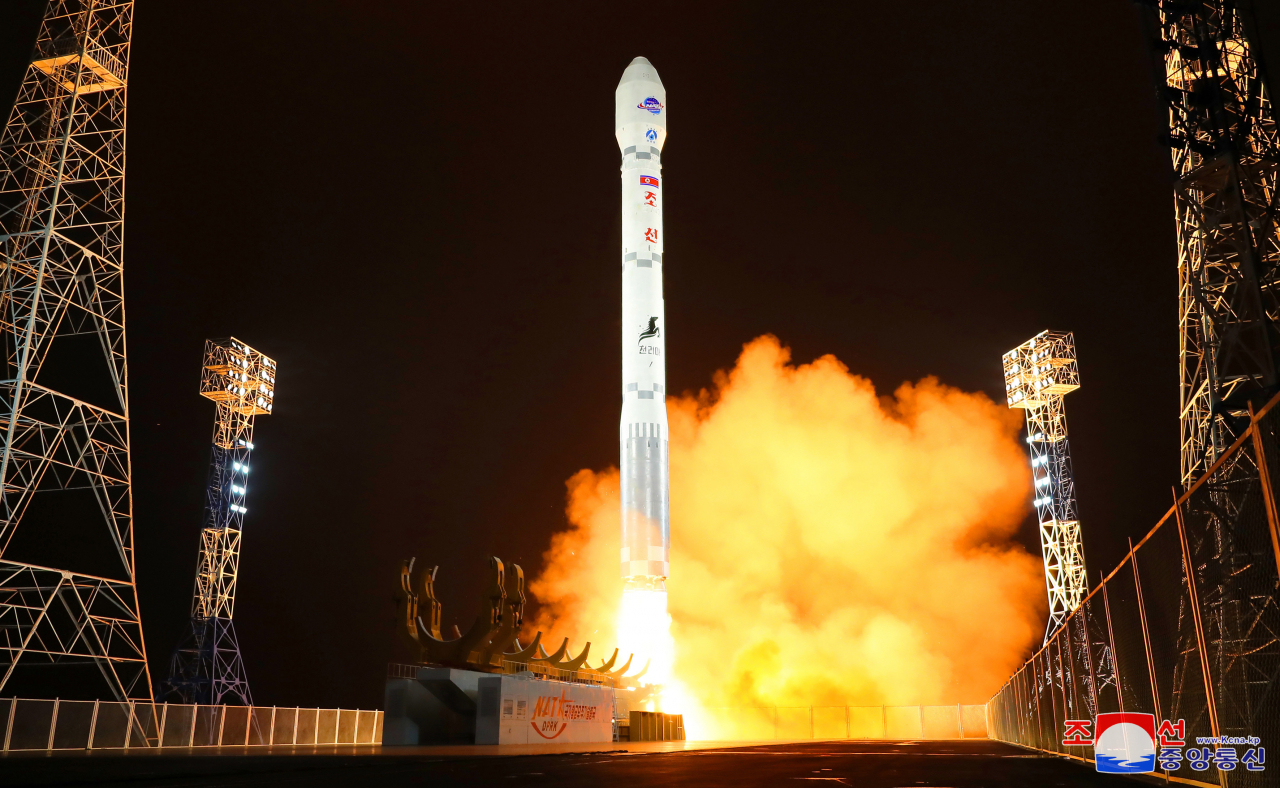N. Korea says it successfully placed spy satellite into orbit, will launch more
By YonhapPublished : Nov. 22, 2023 - 09:18

North Korea said Wednesday it has successfully placed a spy satellite into orbit and will launch several more satellites "in a short span of time" to secure its reconnaissance capabilities against South Korea.
The state-run Korean Central News Agency said that the North launched a reconnaissance satellite called the Malligyong-1 on a new type of Chollima-1 rocket from a launch site in Tongchang-ri on the west coast at 10:42 p.m. Tuesday.
The purported success followed two earlier botched launch attempts in May and August, respectively. It came amid growing speculation that Russia might have provided the North with military technology in return for the North's supply of military equipment and munitions for use in Russia's war in Ukraine.
"The carrier rocket 'Chollima-1' flew normally along the preset flight track and accurately put the reconnaissance satellite 'Malligyong-1' on its orbit at 22:54:13, 705s after the launch," the KCNA said in an English-language report.
North Korean leader Kim Jong-un observed the launch at the site and congratulated officials, scientists and technicians associated with the launch preparations, it said.
Pending a detailed analysis of the launch, South Korea and the United States did not confirm whether it was a success. But they condemned it as a violation of multiple UN Security Council resolutions banning any test using ballistic missile technology.
In response to the launch, Seoul said it will resume reconnaissance and surveillance activities around the inter-Korean border as it vowed to take steps to suspend part of a 2018 inter-Korean military agreement designed to reduce border tensions and prevent accidental clashes.
The North defended the latest launch as its "legitimate" right to strengthen "self-defensive capabilities" and vowed to launch several additional spy satellites "in a short span of time," according to the KCNA.
"(The launch) will make a significant contribution to definitely ramping up the war preparedness of the armed forces of the Republic," the KCNA said.
A Seoul official said that the North's latest launch can be considered an actual success when the "satellite circles the earth in orbit several times."
South Korea's Joint Chiefs of Staff said that it is conducting a comprehensive analysis on the specifics of the rocket, while pledging that Seoul and Washington will maintain a "robust" defense posture.
"North Korea's military satellite launch constitutes a provocative act that blatantly violates the UN Security Council resolutions prohibiting its use of ballistic missile technology as well as scientific and technological cooperation," the JCS said in a text message to reporters.
The JCS said that South Korea, the US and Japan had deployed Aegis destroyers near the planned flight path in advance to jointly detect and track the North's satellite and shared relevant information shortly after the launch.
Tuesday's launch came hours before the beginning of a 10-day launch window that the North had given Japan earlier as a safety warning, saying it would launch a satellite-carrying space rocket sometime between Wednesday and Dec. 1.
Following the launch, South Korea's presidential National Security Council said it will take steps to suspend part of the 2018 inter-Korean military agreement.
The agreement established buffer zones and no-fly zones near the inter-Korean border that include a ban on artillery firing, naval drills and surveillance activities to prevent clashes between the two Koreas.
The White House said that the US "strongly" condemns the North's launch, which it called a "brazen" violation of multiple UNSC resolutions.
Seoul and Washington have expressed concerns over Pyongyang's preparations for a spy satellite launch with technological assistance from Russia following a rare summit between North Korean leader Kim Jong-un and Russian President Vladimir Putin in September.
Defense Minister Shin Won-sik said during Sunday's media interview that North Korea is believed to have overcome its engine problems in its satellite with Russia's assistance.
A military spy satellite is among the high-tech weapons that the North has vowed to develop to enhance its defense capability, which also include solid-fuel intercontinental ballistic missiles and a nuclear-powered submarine.
Tuesday's launch came hours after USS Carl Vinson arrived at a naval base in the southeastern city of Busan. (Yonhap)




















